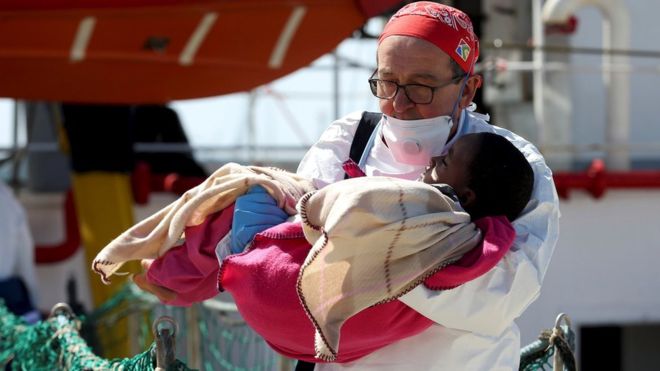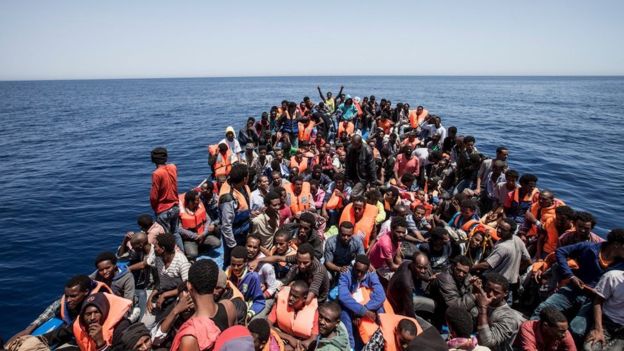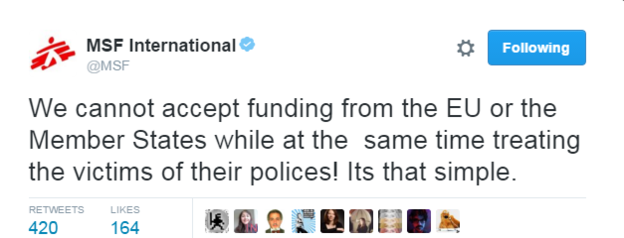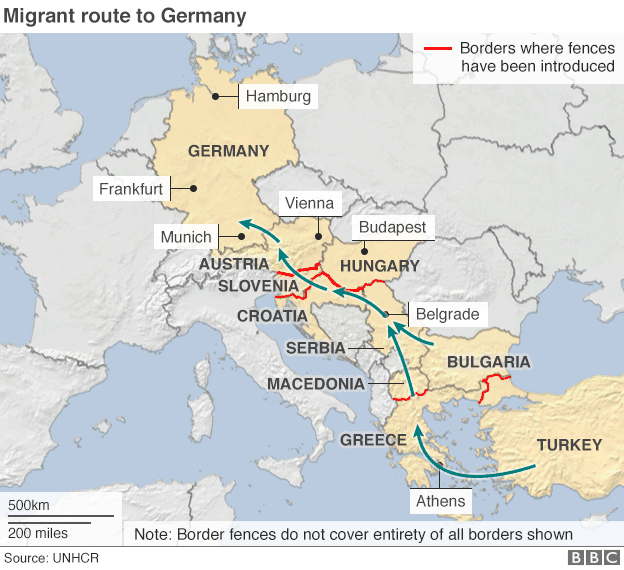Europe Migrant Crisis: Charity Rejects EU Funds over Migration Policy
EUROPE, 20 Jun 2016
BBC News – TRANSCEND Media Service

MSF’s rescue boats have have been actively patrolling international waters close to Libya where many incidents occur. Image copyright Reuters.
Medical aid charity Medecins Sans Frontieres (MSF) says it will no longer take funds from the European Union in protest at its migration policy.
17 Jun 2016 – MSF singled out the EU’s deal with Turkey under which Turkey agreed to take back any migrants who crossed the sea to Greece in smugglers’ boats.
The number of migrants – many from war-torn Syria – to Europe is at its highest level since World War Two.
The charity received $63m (£44m) from the EU and its members last year.
“MSF announces today that we will no longer take funds from the EU and its Member States in protest at their shameful deterrence policies and their intensification of efforts to push people back from European shores,” the group said in a statement.
Migrant crisis: Migration to Europe explained in seven charts
Jerome Oberreit, MSF’s international secretary general, told a news conference that the EU-Turkey agreement went against the fundamental principles of providing assistance to people in need.
He said the deal did nothing to address the chronic deficiencies of EU policy, but simply outsourced European obligations.
“This is really about Europe’s refugee shame,” he said.
MSF said none of its patients would be affected by its decision on funding, and that in the short term it would cover the shortfall from emergency reserves.
The organisation receives 90% of its overall funding from private sources, not governments.
Is the deal working?
The EU-Turkey deal came into effect on 20 March.
Migrants arriving in Greece are now expected to be sent back to Turkey if they do not apply for asylum or their claim is rejected.
For every Syrian migrant sent back to Turkey, one Syrian already in Turkey will be resettled in the EU.
A month into the arrangement, EU officials said it had begun to produce results.
Analysis – By Piers Scholfield in Brussels
Go anywhere on Europe’s well-trodden migrant trail over the past 18 months and you will see familiar red and white MSF logos on tents, filled with recent arrivals from the Middle East and Africa.
MSF says the recently signed EU-Turkey deal – acclaimed as a success by the European Commission – has come at huge human cost.
More than 50,000 refugees remain stranded in Greece, housed in old factories, warehouses and tents, often in dire conditions. The EU’s relocation policy – the idea that these people will be distributed fairly across the continent – is barely functioning.
Desperate, with no prospects, some groups of refugees have even decided to return to Syria, considering they might have a more viable future there.
However, it is the long-term effect of the policy that MSF is worried about.
Mr Oberreit highlighted Kenya, where the government recently cited European migration policy to justify its decision to close the world’s largest refugee camp, Dadaab, in order to send its residents back to Somalia.
And it seems the EU is modelling its future migration policy on the Turkey deal too, offering aid funding to several African countries in order to stop the flow of people leaving – what Mr Oberreit calls the EU buying its way out of its responsibilities and values.
The International Organization for Migration (IOM) estimates that more than 1,011,700 migrants arrived by sea in 2015, though other agencies put that number much higher.
Most of the migrants take the relatively short journey from Turkey to Greece, though some leave from Libya, hoping to make it to Italy.

Critics fear that the EU-Turkey deal could force migrants to start using potentially more dangerous routes, such as the journey between North Africa and Italy. Image copyright Reuters.
‘Gelila’
In the latest incident at sea, more than 200 migrants were rescued from a sinking ship off the coast of Greece on Thursday.
On board was a pregnant Eritrean woman who gave birth shortly after they were rescued. She named the girl “Gelila” meaning “from the ocean”.
The Dutch frigate that conducted the rescue is part of Operation Trident run by European border control agency Frontex.
MSF also has three vessels patrolling the Mediterranean, which it says have rescued 3,349 people in the course of 27 different rescue operations since April.
A note on terminology: The BBC uses the term migrant to refer to all people on the move who have yet to complete the legal process of claiming asylum. This group includes people fleeing war-torn countries such as Syria, who are likely to be granted refugee status, as well as people who are seeking jobs and better lives, who governments are likely to rule are economic migrants.
DISCLAIMER: The statements, views and opinions expressed in pieces republished here are solely those of the authors and do not necessarily represent those of TMS. In accordance with title 17 U.S.C. section 107, this material is distributed without profit to those who have expressed a prior interest in receiving the included information for research and educational purposes. TMS has no affiliation whatsoever with the originator of this article nor is TMS endorsed or sponsored by the originator. “GO TO ORIGINAL” links are provided as a convenience to our readers and allow for verification of authenticity. However, as originating pages are often updated by their originating host sites, the versions posted may not match the versions our readers view when clicking the “GO TO ORIGINAL” links. This site contains copyrighted material the use of which has not always been specifically authorized by the copyright owner. We are making such material available in our efforts to advance understanding of environmental, political, human rights, economic, democracy, scientific, and social justice issues, etc. We believe this constitutes a ‘fair use’ of any such copyrighted material as provided for in section 107 of the US Copyright Law. In accordance with Title 17 U.S.C. Section 107, the material on this site is distributed without profit to those who have expressed a prior interest in receiving the included information for research and educational purposes. For more information go to: http://www.law.cornell.edu/uscode/17/107.shtml. If you wish to use copyrighted material from this site for purposes of your own that go beyond ‘fair use’, you must obtain permission from the copyright owner.


